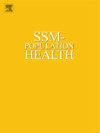Advancing health equity in wastewater-based epidemiology: A global critical review and conceptual framework
IF 3.1
2区 医学
Q1 PUBLIC, ENVIRONMENTAL & OCCUPATIONAL HEALTH
引用次数: 0
Abstract
Population health data from wastewater-based epidemiology (WBE) are being used at unprecedented scales worldwide, yet there is limited focus on how to advance health equity in the field. Addressing this gap, we conducted a critical review of published literature in PubMed, targeting studies at the intersection of WBE and health equity. Of 145 articles assessed in full-text screening, we identified 68 studies with health equity considerations. These studies spanned various spatial scales and biochemical targets, addressing domains such as study design and methodologies, ethical and social considerations, and the feasibility and implementation of WBE monitoring. We summarize and synthesize health equity-oriented considerations across the identified domains. We further propose five key considerations to advance health equity in WBE research and practice, and integrate these considerations into a conceptual framework to illustrate how they apply to major steps in the process of conducting WBE. These considerations include global inequities in WBE access, the need to prevent potential harms and stigma via data misuse (inappropriate reporting of data and potential use of WBE for criminal surveillance), and the importance of regulation and community engagement, particularly amidst the growing privatization of WBE, especially in the United States.
促进基于废水的流行病学中的卫生公平:全球批判性审查和概念框架
来自基于废水的流行病学(WBE)的人口健康数据正在世界范围内以前所未有的规模得到使用,但对如何在该领域促进卫生公平的关注有限。为了解决这一差距,我们对PubMed上发表的文献进行了批判性回顾,以WBE和健康公平交叉的研究为目标。在全文筛选评估的145篇文章中,我们确定了68项考虑健康公平因素的研究。这些研究跨越了不同的空间尺度和生化目标,涉及研究设计和方法、伦理和社会考虑以及WBE监测的可行性和实施等领域。我们总结和综合卫生公平导向的考虑跨确定的领域。我们进一步提出了五个关键考虑因素,以促进卫生公平的卫生保健研究和实践,并将这些考虑因素纳入一个概念框架,以说明它们如何适用于开展卫生保健工作的主要步骤。这些考虑因素包括在获取WBE方面的全球不平等,需要防止因数据滥用(不适当的数据报告和可能使用WBE进行刑事监视)而造成的潜在危害和污名,以及监管和社区参与的重要性,特别是在WBE日益私有化的情况下,特别是在美国。
本文章由计算机程序翻译,如有差异,请以英文原文为准。
求助全文
约1分钟内获得全文
求助全文
来源期刊

Ssm-Population Health
PUBLIC, ENVIRONMENTAL & OCCUPATIONAL HEALTH-
CiteScore
6.50
自引率
2.10%
发文量
298
审稿时长
101 days
期刊介绍:
SSM - Population Health. The new online only, open access, peer reviewed journal in all areas relating Social Science research to population health. SSM - Population Health shares the same Editors-in Chief and general approach to manuscripts as its sister journal, Social Science & Medicine. The journal takes a broad approach to the field especially welcoming interdisciplinary papers from across the Social Sciences and allied areas. SSM - Population Health offers an alternative outlet for work which might not be considered, or is classed as ''out of scope'' elsewhere, and prioritizes fast peer review and publication to the benefit of authors and readers. The journal welcomes all types of paper from traditional primary research articles, replication studies, short communications, methodological studies, instrument validation, opinion pieces, literature reviews, etc. SSM - Population Health also offers the opportunity to publish special issues or sections to reflect current interest and research in topical or developing areas. The journal fully supports authors wanting to present their research in an innovative fashion though the use of multimedia formats.
 求助内容:
求助内容: 应助结果提醒方式:
应助结果提醒方式:


